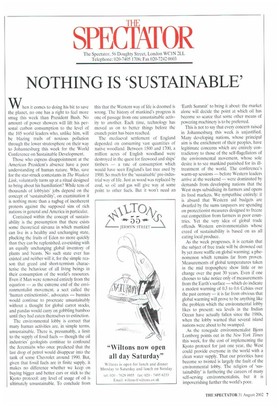NOTHING IS 'SUSTAINABLE'
When it comes to doing his bit to save the planet, no one has a right to feel more smug this week than President Bush. No amount of power showers will lift his personal carbon consumption to the level of the 105 world leaders who, unlike him, will be blazing trails of noxious pollution through the lower stratosphere on their way to Johannesburg this week for the World Conference on Sustainable Development.
Those who express disappointment at the American President's absence have a poor understanding of human nature. Who, save for the star-struck contestants in The Weakest Link, voluntarily turns up at a ritual designed to bring about his humiliation? While tens of thousands of lobbyists' jobs depend on the concept of `sustainability', on examination it is nothing more than a ragbag of incoherent protests against the supposed sins of rich nations in general and America in particular.
Contained within the concept of sustainability is the presumption that there exists some theoretical nirvana in which mankind can live in a healthy and unchanging state, plucking the fruits of Eden no more quickly than they can be replenished, co-existing with an equally unchanging global inventory of plants and beasts. No such state ever has existed and neither will it, for the simple reason that greed and short-termism characterise the behaviour of all living beings in their consumption of the world's resources. Even if Man were removed entirely from the equation — as the extreme end of the environmentalist movement, a sect called the 'human extinctionists', advocates — bunnies would continue to procreate unsustainably without a thought for global carrot stocks, and pandas would carry on gobbling bamboo until they had eaten themselves to extinction.
The environmental lobby is correct that many human activities are, in simple terms, unsustainable. There is, presumably, a limit to the supply of fossil fuels — though the oil industries' geologists continue to confound the Jeremiahs who once predicted that the last drop of petrol would disappear into the tank of some Chevrolet around 1990. But, given that fossil fuels are in finite supply, it makes no difference whether we keep on buying bigger and better cars or stick to the Kyoto protocol: any level of usage of oil is ultimately unsustainable. To conclude from this that the Western way of life is doomed is wrong. The history of mankind's progress is one of passage from one unsustainable activity to another. Each time, technology has moved us on to better things before the crunch point has been reached.
The mediaeval settlement of England depended on consuming vast quantities of native woodland. Between 1500 and 1700, a million acres of English woodland were destroyed in the quest for firewood and ships' timbers — a rate of consumption which would have seen England's last tree axed by 1900. So much for the 'sustainable' pre-industrial way of life. Just as wood was replaced by coal, so oil and gas will give way at some point to other fuels. But it won't need an 'Earth Summit' to bring it about: the market alone will decide the point at which oil has become so scarce that some other means of powering machinery is to be preferred.
This is not to say that every concern raised in Johannesburg this week is unjustified. Many developing nations, whose principal aim is the enrichment of their peoples, have legitimate concerns which are entirely contradictory to those of the self-flagellators of the environmental movement, whose sole desire is to see mankind punished for its illtreatment of the world. The conference's warm-up sessions — before Western leaders arrive at the weekend — were dominated by demands from developing nations that the West stops subsidising its farmers and opens its food markets. We sympathise entirely: it is absurd that Western aid budgets are dwarfed by the sums taxpayers are spending on protectionist measures designed to freeze out competition from farmers in poor countries. Yet the very idea of global trade offends Western environmentalists whose creed of sustainability is based on us all eating local produce.
As the week progresses, it is certain that the subject of free trade will be drowned out by yet more waffle on global warming; a phenomenon which remains far from proven. Measurements of global temperatures taken in the mid troposphere show little or no change over the past 30 years. Even if one chooses to take notice only of measurements from the Earth's surface — which do indicate a modest warming of 0.3 to 0.6 Celsius over the past century — it is far from obvious that global warming will prove to be anything like the problem which the environmental lobby likes to present: sea levels in the Indian Ocean have actually fallen since the 1980s, when the lobby warned that several island nations were about to be swamped.
As the renegade environmentalist Bjorn Lomborg points out in the New York Times this week, for the cost of implementing the Kyoto protocol for just one year, the West could provide everyone in the world with a clean water supply. That our priorities have become so twisted is largely the fault of the environmental lobby. The religion of 'sustainability' is furthering the careers of many self-serving environmentalists, but it is impoverishing further the world's poor.


























































 Previous page
Previous page